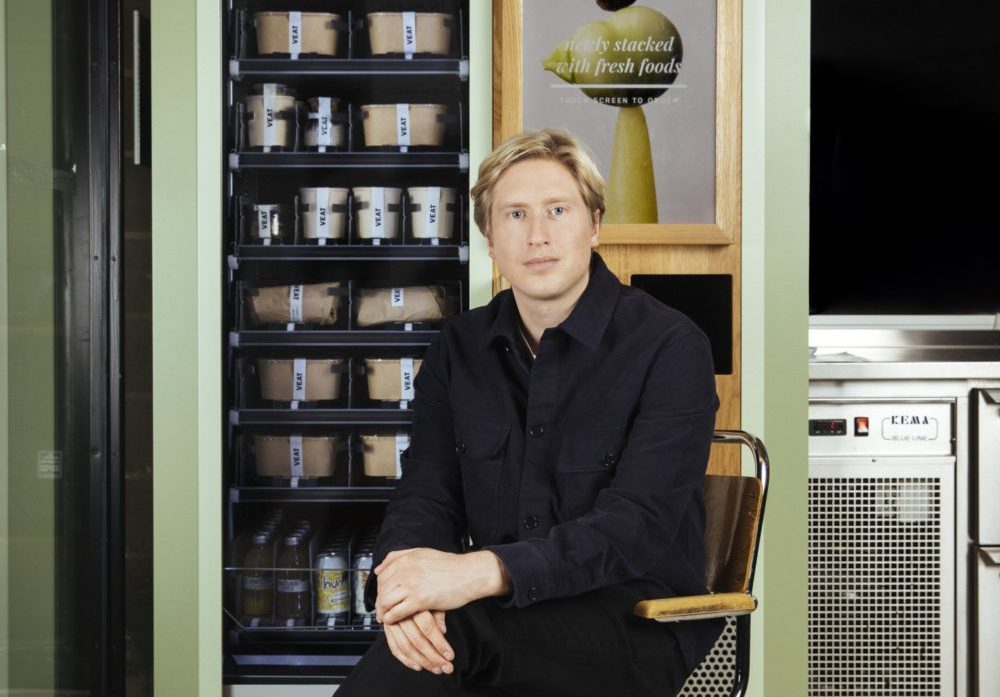What comes to mind when you think of vending machines? For a lot of us, it’ll likely be some variation on the following: often tasty, but almost always regrettably unhealthy, snacks grabbed during hurried moments – a convenient rush-hour sugar rush on the way to work; a late night pick-me-up heading home.
But vending machines, it would seem, are raising their game. That’s partly thanks to a growing trend of healthier ‘grab and go’ vending machine startups making their presence felt in shopping malls, subways, and airports – just check out Chicago’s Farmer’s Fridge, New York’s Fresh Bowl, or Italy’s FrescoFrigo.
In Sweden, there’s vegan vending machine designer VEAT, whose first kiosks are being launched in Stockholm this month. The startup is planning to offer tasty, locally made plant-based meals across the capital.
“We will most likely have Swedish plant-based meatballs on the menu at some point,” VEAT CEO Andreas Karlsson told AFN – a move that would echo the plant-based ball rollout at IKEA, the furniture megastore that operates as a de facto embassy for all tastes Scandinavian.
For now, the chefs that VEAT is working with have conjured up plant-based fare that can be heated up on demand and locally sourced where possible. Options include a ‘rich tomato stew with Swedish pulse-based mince’ or ‘barbecued jackfruit.’
“We’re trying to make Swedes adopt a healthier snacking culture. So instead of offering a brownie, we’re offering a side salad or a wrap,” Karlsson said.
Any food from VEAT kiosks that remains unsold is donated to local charities, he added. One option the startup is exploring for reducing volumes of unsold food is to adopt a ‘surge pricing’ model, where prices change dynamically according to demand.
The plan is to launch about 10 vending machines in Stockholm before the end of the year, with expansion to other European cities in 2021. To fuel this growth, VEAT has just closed a pre-seed funding round of close to $600,000.
Pale Blue Dot, a Malmö-based VC firm exclusively investing in startups that are tackling climate change, led the round. It was joined by Berlin-based early-stage funds Purple Orange Ventures and Shio Equity, alongside several angel investors.
From smart vending machines to robo-cafes
The first launch spots for VEAT’s machines include department stores and office spaces. Amid Covid-19 restrictions, the startup is hoping that consumers see its kiosks as offering a safe and healthy, ‘contactless’ food alternative beyond the conventional restaurant environment, Karlsson said.
The contactless foodservice trend has also seen the emergence of startups leaning on even more advanced automation tech.
Sunnyvale-based Blendid offers a robot chef called B, who is able to mix you a smoothie for $6. Fellow Californian outfit Chowbotics has Sally, its robotic salad-tosser. Prefer a bit of junk food like pizza or burgers? Check out US-based Zume Pizza — which appears to have run into difficult financial straits — or Pazzi, a French robo-pizza maker capable of making 5 million types of pizza. Then, San Francisco restaurant Creator has a robot that flips patties without breaking a sweat.
For robo-coffee in New York, Truebird is building AI-driven micro-cafes, and is also aiming to line the walls of hospitals, airports, and offices. In Austin, Texas, there’s Briggo. A spate of similar-minded companies have sprung up in east Asia, like Singapore’s Ratio, Indonesia’s Kopi Kenangan, and China’s (now infamous) Luckin Coffee.
What do you feel is the future of the vending machine? Send any musings to [email protected]





